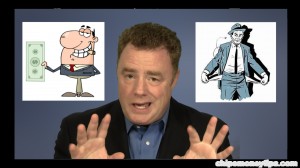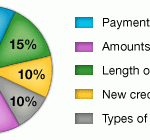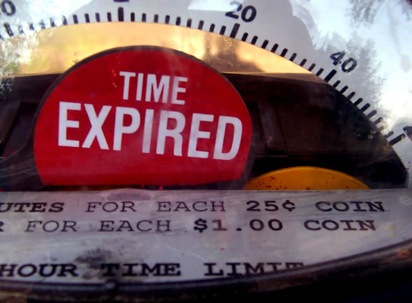I am SO clever with the word play. Reader Cary asked me a question related to my Debt Strategy Sessions. Cary wrote:
“I have some friends who swear by the Dave Ramsey Debt Snowball method of paying the smallest debts off first. But most of what I read says that strategy is too costly. Where do you come out on this?”
My hunch is that Ramsey is appealing to the emotional side of emotional spenders. Paying off the smallest balance, regardless of interest rate on that card, gives someone a “win”. “Hey, I was in debt on three credit cards, I paid off the one that was doing the least damage, and now I only have two left! That’s good, right?!” Yeah, yeah, yeah… you IDIOT!
Without question, it makes the most sense to pay off the highest interest rate credit cards first, because those charge you the most interest, or money.
But people do not always do what makes the most sense. They do what is emotional. In most cases, people got in debt by making emotional purchases of stuff that they could not afford, because those purchases made them feel good.
More Spock, less Snooki
Are we not evolved creatures? Are we going to let emotions guide our actions? You should not pretend that paying off a lower interest card is smarter than paying off a higher interest card. If you have debt, you are an adult – a grup. You need to be honest with yourself and suck it up. Grup it up!
Here are some ideas as to how you can get out of debt:
1. Borrow money from a family member or friend who is LOADED with cash
Total up your debt. Ask for a personal loan for that amount. Offer to pay 4% interest, paying back $X per month. Write up a contract so all parties are on the same page. That’s a great deal for them because it is much more than the 1-2% they could get at a bank. It is also tax free, unless they feel the need to report this to The Man, man. Even so, 4% is still a great deal for all.
Pay off ALL of the card debt. Do not cancel the cards – just stop using them. Canceling the cards lowers your debt to available credit ratio – one of the components of your credit score. Freeze the cards in a block of ice or even cut those up if need be. Just do not cancel the cards.
If the cards charge an annual fee, call the number on the back of the card to ask to convert the account to a free version of the card. This will keep the card’s credit history and duration alive (other credit score factors). That helps your credit score.
Now that the debt is wiped out to the card companies, your debt to available credit drops to zero. Your credit score goes up.
 2. No rich friend? Try P2P
2. No rich friend? Try P2P
Watch my video to learn about Peer to Peer Lending. If that does not work for you, apply for a consolidation loan from your local bank or credit union.
3. And / Or…
Transfer the balances on all of your credit cards to a 0% balance transfer credit card. By far the best card is the Chase Slate card, because there are no transfer fees, no annual fee, and 0% interest for 15 months. Click on “Chip’s Favorite Credit Card Offers” at the top right side of this website for up-to-date deals, terms, and conditions on this card and more. Email me if you have any questions about which card might be right for your situation.
Keep those cards and letters coming!

















Chip, I think your work to help people with their money issues is great, and I know that logically, what you tell people is sound.
However, I have to remind you that if folks could be logical, they wouldn’t have racked up the credit debt in the first place.
Although mathematically it doesn’t make sense to pay off the lower interest cards first (and to be sure, not all small credit line cards are at a lower interest rate), the emotional aspect is equally important. By succeeding, by making progress, it reinforces that you’re doing something. That feeling of accomplishment is VERY important to most people. You have to give up a lot of niceties to live within your means, and so making visible progress makes those sacrifices make more sense.
Also, borrowing money from someone else to pay the credit cards off is a good plan if you can manage it, but most people in a lot of debt don’t have someone to ask for chunks of money, or the follow-through to find someone. And if they’re emotional, then their pride will likely prevent them from doing that, too.
Finally, there’s the larger issue of whether credit scores are actually a good idea or not. Your advice is spot on on how to maintain and increase your credit score, and for those who want to use that, they should do what you suggest.
My view is that credit cards and the companies behind them are evil. They try to make it so that you continually are in debt if they can manage it, and it’s difficult for some (me, for example) to not use a card if it’s there when something comes up that I want, ahem need.
Think of it like AA for credit. If you even have it, it’s tempting, and you have to go cold turkey.
But more to the point, I don’t want to give credit card companies a single dollar more. They tricked me when I was in college, making their “minimum payments” not enough to cover interest. That tricked me into having my debt double when I thought I was paying what was needed. More recently, a card that I had for literally decades decided that because I was one day late, they should raise my interest from 10% to 29%. I tried to convince them to change it back, but instead of treating me like a long time customer, they essentially canceled my card and were going to make me reapply and start over.
And the credit score system is also bogus. It’s too automated, too easily broken.
The bottom line is, I am no longer a fan of debt. It isn’t a popular point of view, I know, but I now believe that if I can’t afford it, I shouldn’t buy it. Yes, renting isn’t the most efficient use of money, but unless you have a bunch of money saved up, it’s clear that you can’t really depend on any current job to always be there, and isn’t that the whole idea of a mortgage or credit? That you will be earning a certain amount for a while, and therefore can justify the loan?
What I’m saying is, why do we live in a world where if I do save money and have it in the bank, but have no credit cards, that I am below someone with a lot of revolving credit? Why? Because my saving doesn’t make banks as much money as being in debt. That makes no sense, and I refuse to support it any longer. They’ve gotten more than enough of my money as it is.
Again, Chip, your advice is technically correct, and for those with the discipline, it works. But I feel like we need to deflate the vampiric system that has been feeding off of our hard earned wages and instead plan to spend within our means..
Hi Eliot,
Thanks for your comment. We agree in so many areas here. Spending within our means is the biggie.
As we know from joke books, there are many ways to screw in a light bulb. If someone’s personalty is such that the way out of debt for them is the Debt Snowball method, by all means go that route. It will be more expensive than what I suggest. Then again, I am not a snowball guy. I’m a pay-off-the-highest-interest-first guy. That’s how I am wired.
I disagree that card companies are evil, but they certainly can be massive jerks. When they tripled a family member’s rate to 28.5%, I fought back with a li’l Arbitrage. Doing that certainly is not for everyone! It made me feel mucho bettero.
People should not beat themselfves up over renting. As I say in this post, homeownership is not necessarily a great deal.
Chip